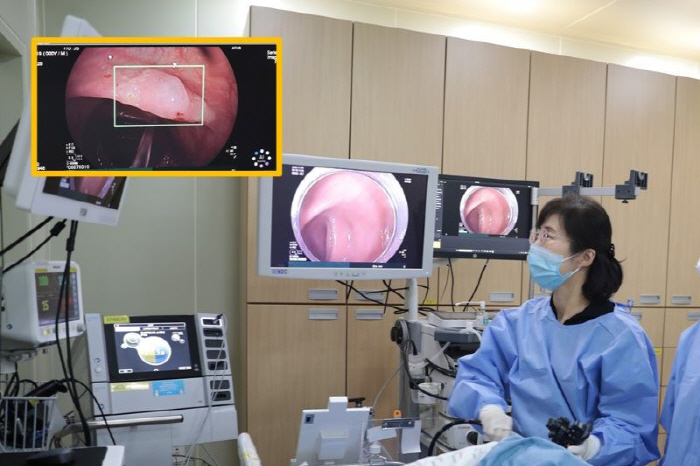AI-assisted colonoscopy finds 32% more adenomas
Nov 18, 2025
Colorectal cancer is the third most common cancer in the world and is the second leading cause of cancer death. To prevent colorectal cancer, it is important to manage the abnormally growing lump in the colonic mucosa, 'polyp'. Although most colorectal polyps are non-tumor without symptoms, the precancerous polyp 'adenoma' is likely to develop into colorectal cancer, so the adenoma should be removed early through colonoscopy.
Due to this importance, the detection rate of colorectal adenoma has long been used as a major quality indicator for colonoscopy. However, the need for technical supplementation has been raised as there is a possibility of missing adenoma during colonoscopy due to factors such as patient characteristics, operator proficiency, and fatigue. In this situation, a study found that using AI (artificial intelligence) during colonoscopy can increase the detection rate of adenoma.
Professor Hyun-joo Jang (corresponding author), Se-hyup Kye, and Da-yeon Ham of the Department of Gastroenterology at Dongtan Sacred Heart Hospital of Hallym University demonstrated these results in a study on improving the detection rate of colorectal adenoma in AI-assisted colonoscopy.
The research team compared the test results of 474 people who underwent AI-assisted colonoscopy from March 2023 to February 2024 at Hallym University Dongtan Sacred Heart Hospital and 474 people who underwent standard colonoscopy. The two groups were classified by calculating propensity scores based on the patient's age, sex, body mass index, colonoscopy indication, bowel cleansing score, and test time. The examination was conducted by four specialists with at least 3000 colonoscopy experience and five gastroenterologists (fellows). After that, the detection rate of colon adenomas and polyps, the number of adenomas and polyps found per test, and the characteristics of polyps were analyzed.
The AI-assisted colonoscopy system automatically detects colon polyps in real time with a deep learning-based algorithm, displays the suspected colon polyps in a green box on the screen, and informs the operator through a warning sound.
As a result of the analysis, AI-assisted colonoscopy had a higher detection rate of colon adenomas and polyps than standard colonoscopy, and the number of adenomas and polyps found per test was higher. The adenoma detection rate was 36% for AI-assisted colonoscopy, which improved 1.36 times compared to 26% for standard colonoscopy. The number of adenomas found per test was also 0.69, which was 60% higher than the standard colonoscopy of 0.43.
The polyp detection rate was 53.2% for AI-assisted colonoscopy, which was 1.15 times better than that of standard colonoscopy 46.2%, and the number of polyps found per test was 1.23 for AI-assisted colonoscopy, which was 32% higher than standard colonoscopy 0.93. However, there was no difference between the two groups in the distribution of polyps' location, size, shape, and organizational type.
Professor Hyun-joo Jang said, "In this study, it has been confirmed that AI-assisted colonoscopy can improve the detection rate of colorectal adenomas that are the seeds of colorectal cancer." The AI-assisted system is expected to improve the quality of colonoscopy and increase the effectiveness of preventing colorectal cancer by supplementing the limitations experienced by humans such as fatigue, difference in skill level, and time pressure of the operator", he explained. Professor Jang also explained, "However, the AI assistive system had a high incidence of false positives (false positives) in areas that were not completely exposed due to mucosal wrinkles or residues in the large intestine, and showed limitations in detecting advanced adenoma."It was found that the role of endoscopic physicians is still important despite the usefulness of AI." The findings were published in the October issue of the SCIE-level international medical journal 'BMC Gastroenterology (I.F. 2.6).'
Due to this importance, the detection rate of colorectal adenoma has long been used as a major quality indicator for colonoscopy. However, the need for technical supplementation has been raised as there is a possibility of missing adenoma during colonoscopy due to factors such as patient characteristics, operator proficiency, and fatigue. In this situation, a study found that using AI (artificial intelligence) during colonoscopy can increase the detection rate of adenoma.
Professor Hyun-joo Jang (corresponding author), Se-hyup Kye, and Da-yeon Ham of the Department of Gastroenterology at Dongtan Sacred Heart Hospital of Hallym University demonstrated these results in a study on improving the detection rate of colorectal adenoma in AI-assisted colonoscopy.
The research team compared the test results of 474 people who underwent AI-assisted colonoscopy from March 2023 to February 2024 at Hallym University Dongtan Sacred Heart Hospital and 474 people who underwent standard colonoscopy. The two groups were classified by calculating propensity scores based on the patient's age, sex, body mass index, colonoscopy indication, bowel cleansing score, and test time. The examination was conducted by four specialists with at least 3000 colonoscopy experience and five gastroenterologists (fellows). After that, the detection rate of colon adenomas and polyps, the number of adenomas and polyps found per test, and the characteristics of polyps were analyzed.
The AI-assisted colonoscopy system automatically detects colon polyps in real time with a deep learning-based algorithm, displays the suspected colon polyps in a green box on the screen, and informs the operator through a warning sound.
As a result of the analysis, AI-assisted colonoscopy had a higher detection rate of colon adenomas and polyps than standard colonoscopy, and the number of adenomas and polyps found per test was higher. The adenoma detection rate was 36% for AI-assisted colonoscopy, which improved 1.36 times compared to 26% for standard colonoscopy. The number of adenomas found per test was also 0.69, which was 60% higher than the standard colonoscopy of 0.43.
The polyp detection rate was 53.2% for AI-assisted colonoscopy, which was 1.15 times better than that of standard colonoscopy 46.2%, and the number of polyps found per test was 1.23 for AI-assisted colonoscopy, which was 32% higher than standard colonoscopy 0.93. However, there was no difference between the two groups in the distribution of polyps' location, size, shape, and organizational type.
Professor Hyun-joo Jang said, "In this study, it has been confirmed that AI-assisted colonoscopy can improve the detection rate of colorectal adenomas that are the seeds of colorectal cancer." The AI-assisted system is expected to improve the quality of colonoscopy and increase the effectiveness of preventing colorectal cancer by supplementing the limitations experienced by humans such as fatigue, difference in skill level, and time pressure of the operator", he explained. Professor Jang also explained, "However, the AI assistive system had a high incidence of false positives (false positives) in areas that were not completely exposed due to mucosal wrinkles or residues in the large intestine, and showed limitations in detecting advanced adenoma."It was found that the role of endoscopic physicians is still important despite the usefulness of AI." The findings were published in the October issue of the SCIE-level international medical journal 'BMC Gastroenterology (I.F. 2.6).'
|
This article was translated by Naver AI translator.














